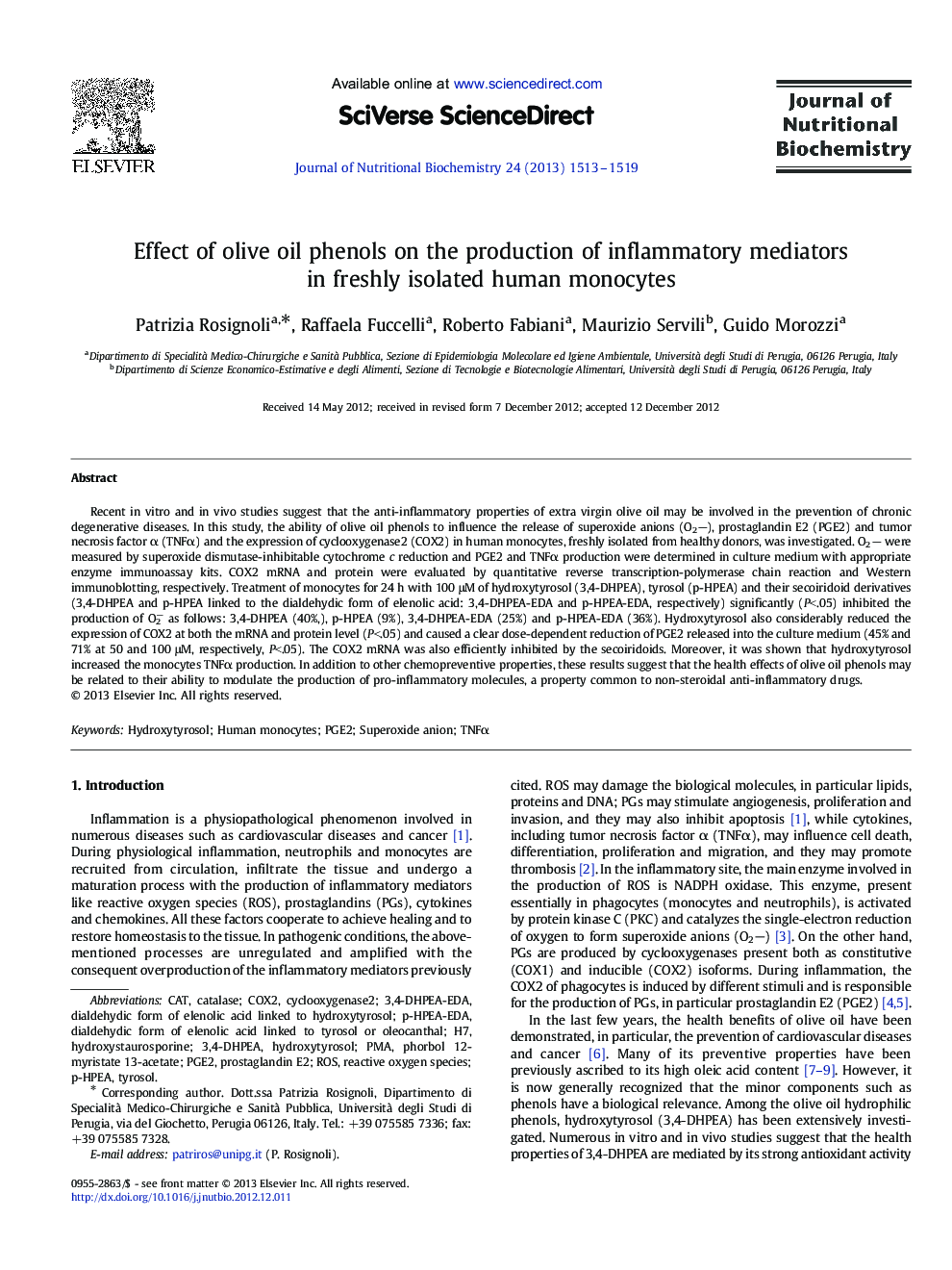| کد مقاله | کد نشریه | سال انتشار | مقاله انگلیسی | نسخه تمام متن |
|---|---|---|---|---|
| 8337321 | 1540670 | 2013 | 7 صفحه PDF | دانلود رایگان |
عنوان انگلیسی مقاله ISI
Effect of olive oil phenols on the production of inflammatory mediators in freshly isolated human monocytes
ترجمه فارسی عنوان
اثر فنول های روغن زیتون بر تولید واسطه های التهابی در تک سلول های تازه انسانی
دانلود مقاله + سفارش ترجمه
دانلود مقاله ISI انگلیسی
رایگان برای ایرانیان
موضوعات مرتبط
علوم زیستی و بیوفناوری
بیوشیمی، ژنتیک و زیست شناسی مولکولی
زیست شیمی
چکیده انگلیسی
Recent in vitro and in vivo studies suggest that the anti-inflammatory properties of extra virgin olive oil may be involved in the prevention of chronic degenerative diseases. In this study, the ability of olive oil phenols to influence the release of superoxide anions (O2â), prostaglandin E2 (PGE2) and tumor necrosis factor α (TNFα) and the expression of cyclooxygenase2 (COX2) in human monocytes, freshly isolated from healthy donors, was investigated. O2â were measured by superoxide dismutase-inhibitable cytochrome c reduction and PGE2 and TNFα production were determined in culture medium with appropriate enzyme immunoassay kits. COX2 mRNA and protein were evaluated by quantitative reverse transcription-polymerase chain reaction and Western immunoblotting, respectively. Treatment of monocytes for 24 h with 100 μM of hydroxytyrosol (3,4-DHPEA), tyrosol (p-HPEA) and their secoiridoid derivatives (3,4-DHPEA and p-HPEA linked to the dialdehydic form of elenolic acid: 3,4-DHPEA-EDA and p-HPEA-EDA, respectively) significantly (P<.05) inhibited the production of O2â as follows: 3,4-DHPEA (40%,), p-HPEA (9%), 3,4-DHPEA-EDA (25%) and p-HPEA-EDA (36%). Hydroxytyrosol also considerably reduced the expression of COX2 at both the mRNA and protein level (P<.05) and caused a clear dose-dependent reduction of PGE2 released into the culture medium (45% and 71% at 50 and 100 μM, respectively, P<.05). The COX2 mRNA was also efficiently inhibited by the secoiridoids. Moreover, it was shown that hydroxytyrosol increased the monocytes TNFα production. In addition to other chemopreventive properties, these results suggest that the health effects of olive oil phenols may be related to their ability to modulate the production of pro-inflammatory molecules, a property common to non-steroidal anti-inflammatory drugs.
ناشر
Database: Elsevier - ScienceDirect (ساینس دایرکت)
Journal: The Journal of Nutritional Biochemistry - Volume 24, Issue 8, August 2013, Pages 1513-1519
Journal: The Journal of Nutritional Biochemistry - Volume 24, Issue 8, August 2013, Pages 1513-1519
نویسندگان
Patrizia Rosignoli, Raffaela Fuccelli, Roberto Fabiani, Maurizio Servili, Guido Morozzi,
